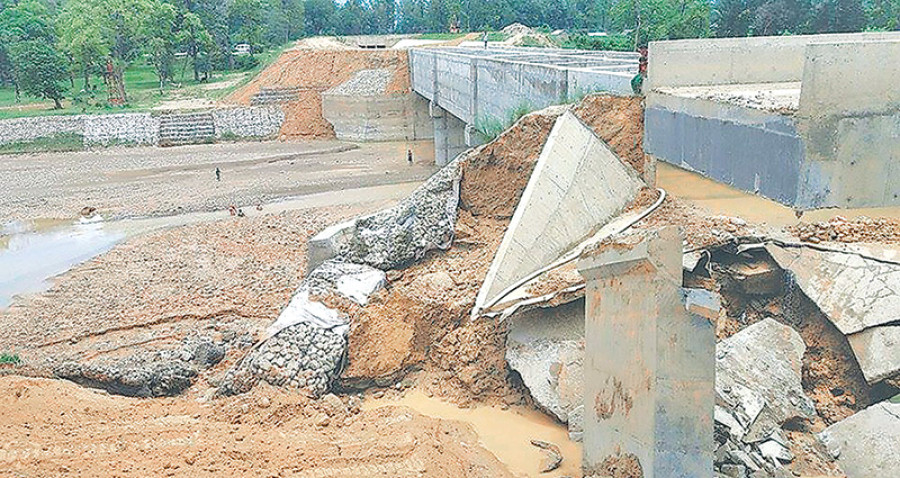National
Probe questions consultants’ role in Sikta canal collapse
Repeated collapses of the main canal of the multi-billion-rupee Sikta Irrigation Project were due to the failure to spot dissoluble soil during project design, a probe has found.
Prithvi Man Shrestha
Repeated collapses of the main canal of the multi-billion-rupee Sikta Irrigation Project were due to the failure to spot dissoluble soil during project design, a probe has found.
A government team said consultants, while designing the project, failed to carry a special test of the soil, which led to the construction of a fragile canal.
The main canal was heavily damaged at different sections of a 5-km segment of the 45km channel in June 2016 and July 2018. When the newly built canal was first tested in June 2016, it had collapsed at multiple sections. Despite the contractor—Kalika Cons-truction—repairing the canal, it broke in July again during another test. The quality of works at the national pride project that aims to irrigate 80 percent of the arable land in Banke district has been in question after repeated collapses of the canal.
After the canal failed two tests in two years, the government formed a five-member team led by Sushil Chandra Tiwari, joint-secretary at the Ministry of Energy, Water Resources and Irrigation, on August 9. The panel submitted its report on Friday.
“The detailed project report prepared by the consultant says nothing about the presence of the dissoluble soil in the area where the canal collapsed,” Tiwari told the Post on Saturday.
Similar is the conclusion of the parliamentary team led by Purna Kumari Subedi, chairperson of the Agriculture, Cooperative and Natural Resources Committee, which conducted a field visit a few days ago. Both the teams found that the canal broke down as it was built on dissoluble soil in the 5km section.
Had the soil been tested properly, the teams said, the contractor could have taken measures to prevent the damage. Subedi said that failure was avoidable with proper information about the surface of the land.
“In Mahakali Irrigation Project, similar problem has been avoided through soil treatment with prior information about the nature of soil,” she said.

Subedi added that her team was also informed by the Sikta project officials that special test of soil was skipped due to the absence of technology in the past. The type of soil was noticed only when the problem arose.
In its 55th annual report, the Office of the Auditor General blamed negligence on part of the builders for the defect. “Despite clear presence of dissoluble soil on the surface, its identification, analysis and treatment were not conducted before constructing the canal,” it stated.
Lahmeyer International GmbH from Germany had first studied the feasibility of the project in 1980. Then Department of Hydrology and Metrology conducted further study in 1983 but the project did not take off before 2002 in the lack of external funding.
In 2004, the Irrigation Development Programme under the European Union submitted a detailed feasibility study stating that the project is technically, economically and socially feasible. This had encouraged the government to start the project by itself. These studies failed to find the find the soil issue, said Tiwari.
According to him, the consultant appointed for supervision and review of the design didn’t recommend measures necessary to avoid the collapse either. The Tiwari-led team has suggested filling the area that caved in with a
type of soil that supports the structure.
Besides, the project is vulnerable to flooding on small streams that flow north to south, according to the teams, while the main canal is aligned east-west. “Due to sediment on small streams above the canal, water in them
does not follow the natural course,” said Subedi, adding that about 15 metres of the canal was damaged by external impact of water currents.
Due to the glitches, construction of the project has been delayed and overall cost shot up. When the project was initiated in 2005-06, it was supposed to be completed by 2014-15 at an estimated cost of Rs12.8 billion. Officials now say the project may not be completed before 2019-20. By the time it is fully operational, the project is expected to cost Rs25.02 billion.
The CIAA has also been investigating the matter.




 15.12°C Kathmandu
15.12°C Kathmandu















